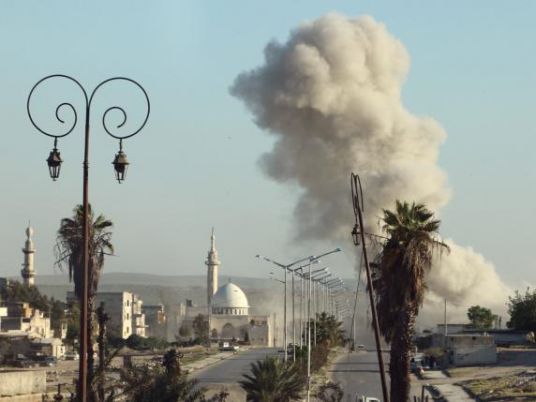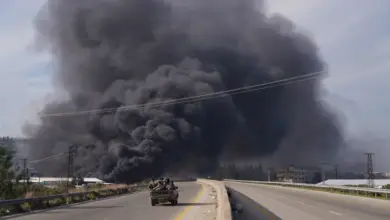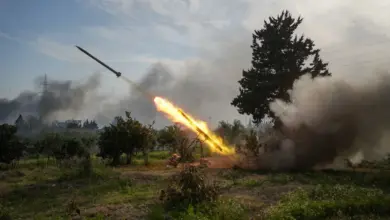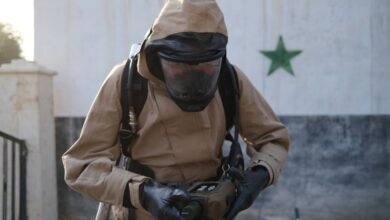
Syrian peace talks appeared all but doomed on Tuesday after air strikes killed about 40 people in a crowded vegetable market in rebel territory, with the opposition saying a truce was finished and it would keep out of negotiations indefinitely.
A monitoring group said it believed the strike on the market in Maarat al-Numan in Idlib province was the deadliest single attack since a partial ceasefire took effect on February 27.
The main opposition HNC described the attack as a "dangerous escalation" which reinforced its decision a day earlier to suspend negotiations. France described the bloodshed as "another massacre".
A rescue worker said warplanes had simultaneously struck markets in two towns in Idlib killing at least 38 people in Maarat al-Numan and 10 others in nearby Kafr Nubl.
"We have more than 20 cars that have been moving dead and injured to hospitals in the area," said Ahmad Sheikho, a member of the civil defense corps, a rescue service operating in opposition-held territory.
The air strike, accompanied by intense fighting in other areas, appears to leave the fragile six-week-old ceasefire in tatters. The truce was brokered by the United States and Russia to pave way for the first peace talks attended by the warring factions since fighting began five years ago.
Those talks, taking place under UN auspices in Geneva, were already close to collapse after the opposition called a pause on Monday.
"There cannot be a political process which prolongs the life of this regime. We will not accept this," said Riad Hijab, chief coordinator for the main opposition HNC bloc. "We will fight under all circumstances, even with stones. And never give up."
So far, the opposition has been careful to say it is not pulling out of the talks altogether. Some members of its delegation will remain in Geneva for expert-level talks on technical issues like humanitarian aid and swapping prisoners.
But Hijab said he himself was leaving Geneva. There was no chance of returning to the main talks while the government broke the truce, blocked humanitarian access and ignored the issue of detainees, he said.
'Another Massacre'
It was not immediately clear whose aircraft were responsible for the air strikes. Both Syria's own air force and that of its Russian allies have been operating despite the truce.
"We learned today there had been another massacre this morning," French envoy Franck Gellet said in Geneva.
Damascus and Moscow say they are striking only territory held by Islamist fighters who are not covered by the ceasefire, but opposition groups dismiss this, saying the government and Russia use the Islamists to justify wider attacks.
The British-based Syrian Observatory for Human Rights, which monitors the conflict through a network of sources on the ground, said 37 people were killed in Maarat al-Numan and seven in Kafr Nubl. Many of the injured were in a serious condition and the death toll was expected to rise, it said.
Asked if it was the deadliest attack recorded since the ceasefire began, the Observatory's head, Rami Abdulrahman, said: "I believe so."
Ahmed al-Seoud, head of the 13th Division, a foreign-backed faction fighting under the banner of the Free Syrian Army, also gave a death toll of about 40 in Maarat al-Numan and said 80 people were wounded.
The Syrian military could not immediately be reached for comment, and state news agency SANA made no mention of air strikes in Idlib.
As fighting raged and air strikes on rebel-held areas intensified, the opposition urged foreign states to supply them with the means to defend themselves, a reference to the anti-aircraft weapons long sought by insurgents.
US President Barack Obama told Russia's Vladimir Putin in a phone call on Monday that Syria was starting to fray more rapidly. The two Cold War era super-powers are joint sponsors of the peace process and ceasefire, after intensifying diplomacy following Russia's decision last year to join the war, an intervention that tipped momentum Assad's way.
The Geneva talks aim to end a war that has killed more than 250,000 people, created the world's worst refugee crisis, allowed for the rise of the Islamic State group and drawn in regional and world powers.
Damascus blames the rebels for breaking the cessation of hostilities. Chief Syrian government negotiator Bashar Ja'afari said his team was pushing for an expanded government as a solution to the war, an idea rejected by the armed opposition which has fought for five years to oust Assad.
With fighting reported across much of northwest Syria on Tuesday, both sides were obdurate. The government says it is willing to negotiate on a national unity government that could include some opposition figures, but not on the question of Assad leaving power.
"Our mandate in Geneva stops at forming a national unity government," Ja'afari told Reuters. "We have no mandate whatsoever either to address the constitutional issue meaning establishing a new constitution or addressing parliamentary elections or addressing the fate of the presidency."
No date to resume talks
The opposition made clear its suspension of political talks was indefinite.
Still, a Western diplomat said it was important that the opposition delegation had not stormed out altogether.
"They have made this point…that they will not participate in formal meetings for perhaps a short period of time, but are open to continued discussions at the technical level."
Syrian forces backed by Russian warplanes launched a counter-attack against rebels in the northwestern province of Latakia, a rebel group and the Observatory reported.
Targets included towns and villages where the truce agreement had brought about a lull in fighting. Fighters predicted more bloodshed.
"Let's be realistic. The escalation will start," said Bashar al-Zoubi, a rebel leader.
Ahmed Al-Seoud, the head of another rebel group, said he hoped for more military support from Assad's foreign enemies.
Rockets fired by insurgents killed three children in Kefraya, a Shi'ite town loyal to the government, the Observatory said. State media said the dead were members of one family.
Fighting in Latakia focused on areas where insurgent groups had launched an attack on government forces on Monday, and where battles had often erupted despite the cessation of hostilities.
"The regime is trying to storm the area, with the participation of Russian helicopters and Sukhoi [warplanes]," said Fadi Ahmad, spokesman for the First Coastal rebel group in the area.
The Observatory said fighting had raged since morning. Government air strikes were also reported in northern areas of Homs province under rebel control.




